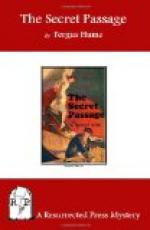“Belonging to me, which Basil had stolen.”
“I didn’t know that either. Well, I went again towards the wall surrounding the park. I thought I might meet you.”
“I wonder you didn’t. I was about at that time.”
“The park was so thickly filled with trees and shrubs that we missed one another I suppose. Don’t interrupt—I am going. Write quickly, Cuthbert.” Then with a gasp Caranby resumed: “I halted to get breath near the large oak which the fire spared. I heard a rustling, and a woman came out of the shadow of the tree. I wondered who she was and where she had come from. The moon then came out brightly, and I recognized her face with a sensation almost of terror. It was Emilia.”
“How did you recognize her after all these years?”
“By her Jewish look, and especially by the eyebrows. Moreover, she revealed herself to me when dying.”
“What happened?” asked Yeo, sharply.
“I was standing with the knife in my hand. Emilia, seeing that I was an intruder, came swiftly towards me. She had a revolver in her hand but did not fire. She cried out something and rushed at me. In doing this she came straight against the knife. I was holding it instinctively in an attitude of defence, with the point outward. She rushed at me to bear me down by the weight and force of her charge, and the next moment she dropped to the ground dying.”
“She was not dead then?”
“No! not for the moment. I knelt beside her and whispered ‘Emilia!’ She opened her eyes and smiled. Then she replied, ‘Emilia—yes!’ and died. I did not know what to do. Then it struck me that I might be arrested for the crime, though it really was no crime. Had she not rushed at me, had I not been holding the knife, she would not have met with her death. I wonder she did not fire, seeing she had a pistol.”
“Perhaps she recognized you,” said Yeo, glancing at Cuthbert, who was writing rapidly.
“No. Had she done so, she would never have attempted to hurt me. She thought I was some spy searching for the factory, and without giving herself time to think dashed forward, believing I would give way and fly. It was all over in a second. I made up my mind to go at once. I did not even wait to pick up the knife, but climbed the wall and came home here. What happened then I don’t know.”
“I can tell you,” said Mallow. “Maraquito and Hale came to look for Miss Loach and took her body into the villa sitting-room. They placed the knife at her feet and the cards in her lap, thinking it would be thought she had been stabbed in the room, and—”
“Sign, sign!” said Caranby, unexpectedly, and Mallow hastily brought him the written document and the ink. He signed feebly, and the two men signed as witnesses. Yeo then turned to his patient, but he drew back. Death was stamped on the face.
Cuthbert called in the servant. “Lord Caranby is dead,” he said quietly.




